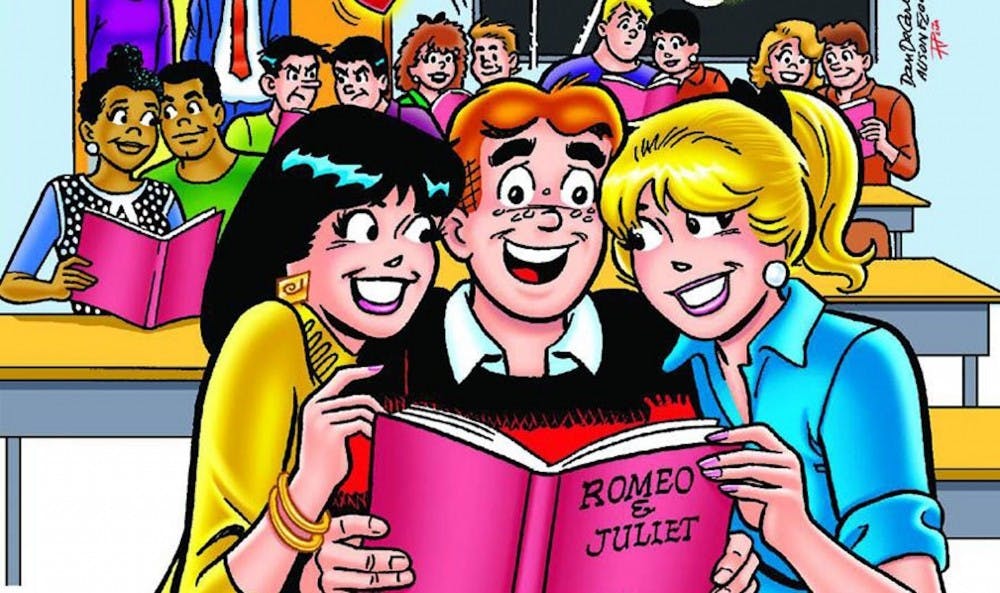As a child, I devoured “Archie” comics, intrigued by the perpetual chase for Archie by Betty and Veronica, his two best friends, not realizing the social implications of such relationships. Today, with the start of the second season of “Riverdale,” the show maintains the same classic, comic book feel of its source material, while improving upon its view of women, with the focus on Betty and Veronica’s strong bond and intelligent and defiant qualities. Targeted toward teens, “Riverdale” includes loud pop music, sultry romance and extreme emotions, and, of course, Archie’s sexual appeal in its first episode of the second season.
In the finale of the first season, Archie’s father Andrew was shot by a disguised gunman. In typical “Riverdale” fashion, Jughead, Betty, Veronica and Archie investigate deeper into the mystery of the identity of the gunman, suspecting he was more than an ordinary thug, as Andrew is rushed to emergency surgery in the hospital. The episode introduces a new Reggie, played by Charles Melton (the previous actor, Ross Butler, left the cast) and reintroduces Ms. Grundy, who’s pursuing a romantic relationship with a high school student, as she had with Archie last season.
Archie’s father was on the cusp of life and death, and Archie exhibits a wide range of emotions, both impressive for such a one-dimensional character and unsettling because of its unnatural feeling. Rushing to the emergency room with doctors flanking him, Archie contributes to an overdramatized and bland scene. It is a replica of the stereotypical hospital rush scene, Archie visibly stressed and crying without tears, succeeding in leaving the audience with absolutely no emotional attachment. His appearance and lack of emotional depth put an awkward distance between Archie and the audience, who are unable to sympathize or relate to his feelings. In a bizarre break from the action at the hospital, Archie returns home, strangely recovered and nonchalant, and engages in passionate displays of affection with Veronica. It could be that he is repressing his anxiety as an aroused teenager, but it seems more like an excuse for the show to prominently display Archie and Veronica’s relationship status. Archie eventually realizes what he’s doing and returns to his teary state, a touch more convincing than before. As the episode progresses, Archie begins to shed, little by little, his insubstantiality to vaguely reveal a more relatable, high school adolescent — despite his impeccable six-pack and resemblance to a 20-year-old. Hopefully, he’ll be able to further expand the complexity of his character in the rest of the season.
Unlike Archie, characters such as Cheryl and Veronica have developed distinct personalities. In the hospital, Cheryl follows her mother, covered in burns, after their mansion went up in flames. This kind of scene would typically be a very tragic one, but for Cheryl it is uniquely disturbing, as she is known as a manipulative, unfeeling character. Her new superiority and control over her mother fits perfectly with her archetype as a cold, complicated character, and she provides comic relief as she visits Andrew’s hospital bed to give him an eerie “kiss of life.” She's not exactly defined, as she looked sorrowful following the death of her brother and formed random, temporary alliances with Archie and his friends last season, contributing to the mystery and eccentricity of her character. On the other hand, Veronica, sticking by Archie’s side like a committed girlfriend, is remarkably better at appearing sad, though when she is turned away by a rude Archie, she presents herself as an impressively sharp, strong woman. She stands up for herself again as she faces her family history and accuses her mother, Hermione, of causing Andrew’s accident. Her mother unveils a dark side despite her angelic disposition in the first season and adds another twist to the developing plot.
As the plot unfolds in in Jughead’s narrative, a unique perspective is occasionally shown: that of the unconscious Andrew. As one scene follows the next, it is hard to distinguish the “actual” events from the hypothetical events of Andrew’s mind, a formal technique similar to the literary stream-of-consciousness. Andrew imagines hypothetical future situations in which Archie is growing up and pushing him away and closer to an unidentified destination, death. This euphemistic concept of approaching death is played in short clips woven throughout the episode, provoking pity and even fear for his life.
Though it might be another teenage drama, “Riverdale” holds the same addictive quality as shows such as “Pretty Little Liars” and “Gossip Girl,” providing an excellent, entertaining escape that fills the void for romance, action and mystery.
Get The Chronicle straight to your inbox
Signup for our weekly newsletter. Cancel at any time.

